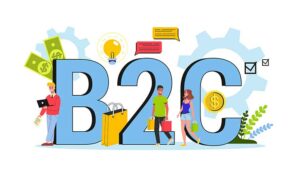What is Business to Consumer (B2C)?
The Business to Consumer (B2C) model involves companies making sales directly to individual consumers rather than to other commercial enterprises.
While the term covers all kinds of direct-sale businesses such as shops and restaurants, it has increasingly become associated with online sales. This has blurred some of the lines in business–consumer relationships, as many online marketplaces facilitate commerce between consumers.
For example, sites like eBay deal with consumers who wish to both buy and sell through the platform, forming networks of Business to Business, Business to Company, and Company to Company interactions.
B2C and B2B Distinctions
Whether online or in person, the B2C model is distinct from B2B in many ways. Unlike corporate customers, individuals are less likely to make purchases based on an established need. Instead, B2C marketing is dependent on making consumers desire a product, and brands must trigger an emotional response.
Marketing directly to consumers also involves understanding and segmenting demographic groups. Whereas the potential market for a B2B interaction might be ‘enterprises that need IT support services’, the B2C market is more likely to be something like ‘women aged 35–50’.
Because of this, B2C marketing begins with intensive research. Marketers must establish how to reach their audience, what kind of content will attract their attention, and how to convert them into customers and advocates.
The modern audience is less influenced by traditional advertising, and is more likely to be drawn to content that is designed to be amusing. The focus is less on creating informative adverts than on creating media that will viewed and shared voluntarily.
Online Selling
Businesses reap clear advantages from being able to sell online. The reduction in staff numbers and physical store space decreases overheads on some of the most expensive aspects of running a business.
There are also major challenges to working online. The barriers to entry are so low that virtually anyone can set up an online business, which drives competition and puts pressure on pricing. The increased ability of consumers to research and compare offerings has also led to an observable decrease in brand loyalty.
Online sellers must grapple with ever-changing expectations. The rise of Search Engine Marketing (SEM) and Search Engine Optimisation (SEO) place high demands on a business’s ability to monitor and adapt its presence online. Google data shows that companies which fail to get on the first page of search results derive almost no value at all from their presence.
Additional challenges are presented by social media, mobile computing, and the Internet of Things. These growth areas have left many business planners wondering how they can derive benefit from such resources.
From the consumer perspective, there are significant security implications related to making purchases online. Services like PayPal guarantee secure transactions, which has always been one of the major concerns around online marketing.
SSL (Secure Sockets Layer) certificates increase consumer confidence, as do PCI (Payment Card Industry) compliance rules, which protect consumer financial information.
Distance-selling regulations grant consumers a level of protection designed to be proportionate to the risks of making purchases online. In some ways, distance-selling regulations protect online purchases more totally than live purchases.
The technological focus of modern consumers places a greater than ever pressure on businesses to innovate. In most cases it is no longer enough to provide an excellent product or service; the offering must also be packaged to appeal to the modern, tech-savvy audience.
Author: Jonty Pearce
Reviewed by: Robyn Coppell
Published On: 24th Mar 2017 - Last modified: 21st Jan 2026
Read more about - Definitions, Communication Skills, Terminology















